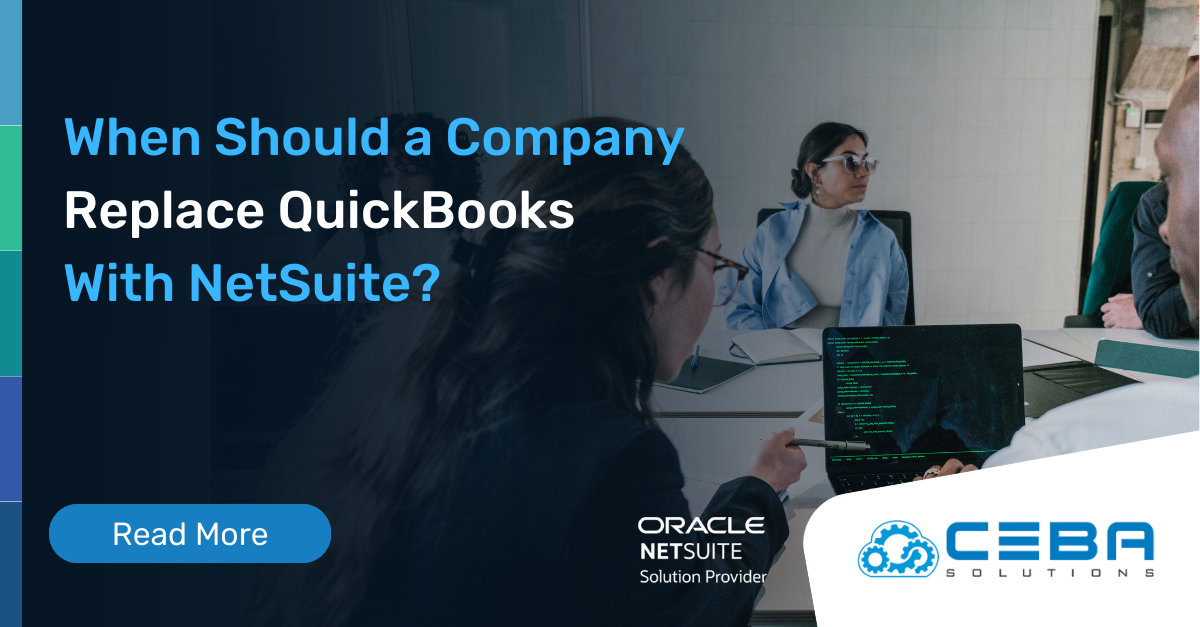
Still on QuickBooks? Here are 10 Clear Signs that it’s Time to Move to NetSuite
Still on QuickBooks? Here are 10 Clear Signs that it’s Time to Move to NetSuite
If your basic business management software, spreadsheets, and disconnected systems are throttling organizational growth, here are the six clear signs that it’s time to move to NetSuite’s cloud enterprise resource planning (ERP) platform.
As your company grows, accounting invariably becomes more complex. When you add a new customer, expand your company’s scope, reach out to a new geography, or add a new employee, those complexities increase. It doesn’t take company leaders long to realize that the basic accounting systems they installed years ago no longer meet their needs.
“Handling mature business challenges using spreadsheets and clusters of disparate applications just doesn’t work,” NetSuite points out in NetSuite vs. QuickBooks: Why You Should Make the Switch, which is why companies often upgrade from QuickBooks to NetSuite.” Here are ten more clear signs that it’s time to ditch QuickBooks for a unified ERP like NetSuite:
1. You’re still using physical servers.
When corporate data is stored on a physical server, employees have to install QuickBooks on their computers to access it. “This poses a problem when they get new computers or pick up a loaner laptop for a day,” NetSuite points out. “They have to reinstall QuickBooks, which is time-consuming and requires recalling a string of complicated passcodes.” Plus, many QuickBooks licenses only allow a few users into the system at any given time, which means employees have to “remind” each other to log out so others can log in.
2. Accounting teams are doing too much copying and pasting.
QuickBooks presents challenges for companies that use billing systems based on usage (i.e., they charge clients for monthly use of a software or service). “For these billing systems, invoicing in QuickBooks is often tedious and manual,” NetSuite says. “For example, it might entail simply copying last month’s invoices and typing the current month’s data into them. This process can take days.”

3. Your audit trail has holes in it.
When it comes time to seek outside investment, you’ll probably have to go through a financial statement audit that QuickBooks won’t be able to stand up to. Sometimes, the platform may even permit loopholes that open your organization up to the potential for fraud, error, and security risks. With NetSuite, an audit trail is established for most transactions taking place on the platform. All changes and customizations are searchable and trackable, and detailed transaction reports are easy to access and generate.
4. You’re using too many accounting workarounds.
With NetSuite, accounting teams can comply with revenue recognition requirements and automatically schedule revenue to be recognized at the appropriate time. “Financial statements and forecasts are accurate and updated in real-time,” NetSuite states, noting that this is especially helpful for software and services companies dealing with multiple deliverables—such as upgrades, services delivered over time, or additional licenses—that require accounting teams to recognize and defer revenue at different points in time. “QuickBooks can construct clever workarounds for the limitations,” it adds, “but workarounds inevitably generate a morass of manual journal entries, complicated recognition schedule spreadsheets, and unclear or nonexistent forward visibility.”
5. Purchasing controls are nonexistent.
QuickBooks doesn’t provide purchasing controls, while NetSuite’s approval workflow engine ensures that purchasing and accounting controls and policies are followed. “This makes approvals easier in a time when people aren’t sitting next to one another,” NetSuite points out, “whether it’s because of multiple offices or a work-from-home environment.” The ERP also helps enforce segregation of duties by controlling the data, and functionality users have access to via role- and user-based permissions.
6. Month-end closing processes take days or even weeks.
Instead of hitting “copy + paste” on multiple invoices, for example, teams can use SuiteBilling to upload usage files right into the system. Then, instead of working long hours to close their books in the required monthly timeframe, teams often find themselves with time to spare. “Billing becomes a half-day task instead of a three-day project,” NetSuite said, “and CFOs get time to actually review their reports before sending them to investors.”
7. Your IT team is overburdened.
QuickBooks is a desktop application, which means it requires local installation and significant IT resources for maintenance and upgrades. On the other hand, NetSuite is a cloud-based system that can be accessed from anywhere with an internet connection. “This frees up your IT department to focus on more strategic initiatives,” NetSuite said, “and since it’s in the cloud, you don’t have to worry about complex integration projects when you want to add new functionality or connect to other systems.”
8. You can’t keep up with changing tax laws.
QuickBooks doesn’t automatically update to reflect changes in tax laws, which means your accounting team has to do it manually—which can take valuable time away from other tasks. With NetSuite, on the other hand, updates are automatically applied to the system so you can be confident that your books are always compliant.
9. You’re relying on too many spreadsheets.
QuickBooks users often supplement the platform with Excel spreadsheets to compensate for its lack of functionality in certain areas. On the other hand, NetSuite offers a complete suite of integrated modules that can cover all aspects of your business, from accounting and finance to CRM and eCommerce. With NetSuite, you can say goodbye to the days of relying on disparate spreadsheets to run your business.
10. Your company is growing too fast for QuickBooks.
As your business grows, QuickBooks will eventually reach its limit regarding the number of users, transactions, and other data it can handle. On the other hand, NetSuite is designed to scale your business. As your company grows, so does NetSuite. You can add new users, departments, and subsidiaries without worrying about outgrowing your system.
If any of these signs sound familiar, it may be time to consider making the switch from QuickBooks to NetSuite. NetSuite can offer your business the scalability, flexibility, and features you need to take your business to the next level.
Why Choose NetSuite?
Smaller companies and startups may gravitate toward limited, point solutions like QuickBooks. Still, it doesn’t take long to see that they need a more robust, full-featured, cloud-based solution to manage their growing businesses. NetSuite provides a suite of cloud-based financials/ERP and omnichannel commerce software that runs the business of more than 21,000 customers in more than 150 countries and territories.
About CEBA Solutions
CEBA Solutions is a cloud advisory and implementation firm specializing in NetSuite, the world’s number one cloud ERP. We work with companies of all sizes in a wide range of industries to help them take advantage of the many benefits of cloud computing. Our team has extensive experience with ERP systems and knows how to get the most out of NetSuite.
Whether you’re just starting to explore the idea of moving to the cloud or you’re ready to take the plunge, we can help. We offer various services, including cloud assessments, implementation and integration, business process redesign, customizations, training, and support.









